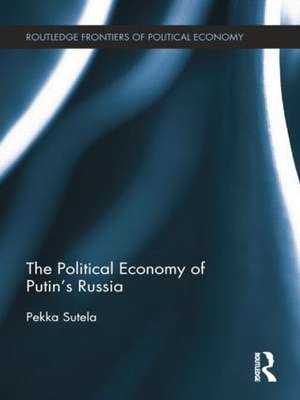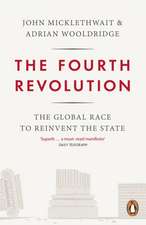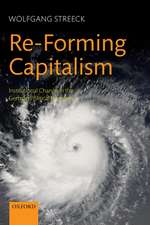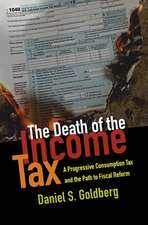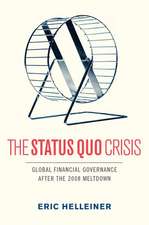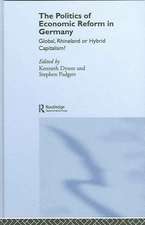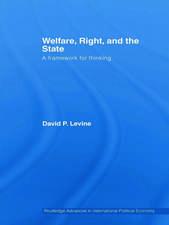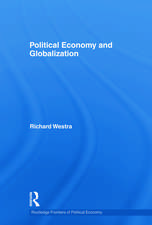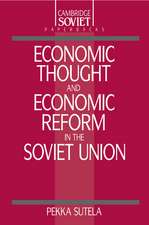The Political Economy of Putin's Russia: Routledge Frontiers of Political Economy
Autor Pekka Sutelaen Limba Engleză Paperback – 19 mai 2014
| Toate formatele și edițiile | Preț | Express |
|---|---|---|
| Paperback (1) | 246.49 lei 6-8 săpt. | |
| Taylor & Francis – 19 mai 2014 | 246.49 lei 6-8 săpt. | |
| Hardback (1) | 851.82 lei 6-8 săpt. | |
| Taylor & Francis – 13 feb 2012 | 851.82 lei 6-8 săpt. |
Din seria Routledge Frontiers of Political Economy
-
 Preț: 326.49 lei
Preț: 326.49 lei -
 Preț: 312.86 lei
Preț: 312.86 lei -
 Preț: 310.95 lei
Preț: 310.95 lei -
 Preț: 309.79 lei
Preț: 309.79 lei - 9%
 Preț: 867.54 lei
Preț: 867.54 lei -
 Preț: 151.96 lei
Preț: 151.96 lei -
 Preț: 286.98 lei
Preț: 286.98 lei -
 Preț: 310.55 lei
Preț: 310.55 lei -
 Preț: 327.83 lei
Preț: 327.83 lei - 9%
 Preț: 1005.48 lei
Preț: 1005.48 lei -
 Preț: 325.09 lei
Preț: 325.09 lei - 9%
 Preț: 938.47 lei
Preț: 938.47 lei -
 Preț: 310.01 lei
Preț: 310.01 lei -
 Preț: 309.30 lei
Preț: 309.30 lei -
 Preț: 309.90 lei
Preț: 309.90 lei -
 Preț: 310.36 lei
Preț: 310.36 lei -
 Preț: 386.11 lei
Preț: 386.11 lei -
 Preț: 316.03 lei
Preț: 316.03 lei -
 Preț: 295.14 lei
Preț: 295.14 lei -
 Preț: 155.43 lei
Preț: 155.43 lei -
 Preț: 311.41 lei
Preț: 311.41 lei -
 Preț: 152.66 lei
Preț: 152.66 lei - 9%
 Preț: 1005.31 lei
Preț: 1005.31 lei -
 Preț: 281.72 lei
Preț: 281.72 lei -
 Preț: 278.97 lei
Preț: 278.97 lei -
 Preț: 311.61 lei
Preț: 311.61 lei -
 Preț: 356.63 lei
Preț: 356.63 lei -
 Preț: 371.95 lei
Preț: 371.95 lei -
 Preț: 310.95 lei
Preț: 310.95 lei -
 Preț: 324.87 lei
Preț: 324.87 lei -
 Preț: 328.76 lei
Preț: 328.76 lei -
 Preț: 359.03 lei
Preț: 359.03 lei -
 Preț: 329.09 lei
Preț: 329.09 lei -
 Preț: 341.32 lei
Preț: 341.32 lei - 26%
 Preț: 1047.06 lei
Preț: 1047.06 lei - 18%
 Preț: 1169.45 lei
Preț: 1169.45 lei - 18%
 Preț: 1555.17 lei
Preț: 1555.17 lei - 18%
 Preț: 1053.92 lei
Preț: 1053.92 lei - 18%
 Preț: 1059.84 lei
Preț: 1059.84 lei - 25%
 Preț: 767.47 lei
Preț: 767.47 lei - 18%
 Preț: 731.92 lei
Preț: 731.92 lei - 26%
 Preț: 822.54 lei
Preț: 822.54 lei - 18%
 Preț: 1796.21 lei
Preț: 1796.21 lei - 26%
 Preț: 1184.91 lei
Preț: 1184.91 lei - 18%
 Preț: 1120.23 lei
Preț: 1120.23 lei - 15%
 Preț: 700.95 lei
Preț: 700.95 lei - 18%
 Preț: 1116.31 lei
Preț: 1116.31 lei - 22%
 Preț: 299.52 lei
Preț: 299.52 lei
Preț: 246.49 lei
Preț vechi: 295.87 lei
-17% Nou
Puncte Express: 370
Preț estimativ în valută:
47.17€ • 48.95$ • 39.43£
47.17€ • 48.95$ • 39.43£
Carte tipărită la comandă
Livrare economică 17-31 martie
Preluare comenzi: 021 569.72.76
Specificații
ISBN-13: 9781138798687
ISBN-10: 1138798681
Pagini: 280
Ilustrații: 29 black & white tables
Dimensiuni: 156 x 234 x 15 mm
Greutate: 0.41 kg
Ediția:1
Editura: Taylor & Francis
Colecția Routledge
Seria Routledge Frontiers of Political Economy
Locul publicării:Oxford, United Kingdom
ISBN-10: 1138798681
Pagini: 280
Ilustrații: 29 black & white tables
Dimensiuni: 156 x 234 x 15 mm
Greutate: 0.41 kg
Ediția:1
Editura: Taylor & Francis
Colecția Routledge
Seria Routledge Frontiers of Political Economy
Locul publicării:Oxford, United Kingdom
Public țintă
Postgraduate and UndergraduateCuprins
1. Introduction: Burden of the Past 2. The Putin Regime 3. Economic Growth 4. Energy 5. Money, Banking and Monetary Policy 6. Welfare 7. Epilogue: Russia’s Response to the 2008 Crisis
Notă biografică
Pekka Sutela is Adjunct Professor at the Aalto University School of Economics in Helsinki, Finland; Nonresident Senior Associate at the Carnegie Endowment for International Peace in Washington DC, USA and President for 2012 of the Association for Comparative Economic Studies. He has published widely in economics and the Soviet and Russian economies.
Recenzii
"This is the best available book on the contemporary Russian economy. In case that sounds like faint praise, let me add that it is, by any standards, excellent. It is economically highly literate but clear to the non-specialist; Pekka Sutela’s command of a wide range of both western and Russian sources is admirable; and the text is full of judicious assessments based on evidence that is clearly presented and carefully weighed." - Philip Hanson, Russia and Eurasia Programme, Chatham House; International Affairs 88: 5, 2012
‘Professor Pekka Sutela stands out as one of the world’s most knowledgeable scholars focused on the Russian economy, both in Soviet times and the present. In this new book, he displays his erudition with his impressive reading of both the Russian and international literature... Sutela’s greatest strength is to penetrate what has really happened in the Russian economy and welfare, and the book offers a complex and realistic view of how output may have developed during the transition... To conclude, this is an excellent, empirical book about the Russian economy under Putin, the best book on that topic to date, a "must-read" for serious experts, and a mine of data and sources. It is a sophisticated book for specialists rather than a light read for a broader audience.’ - Anders Åslund, Eurasian Geography and Economics, No. 4 (2012)
'The book helps to explain, in an accessible way, high-level judicial politics in Yeltsin's tumultuous Russia.' - Alexei Trochev, The Russian Review, April 2013, Vol.72, No.2
‘Professor Pekka Sutela stands out as one of the world’s most knowledgeable scholars focused on the Russian economy, both in Soviet times and the present. In this new book, he displays his erudition with his impressive reading of both the Russian and international literature... Sutela’s greatest strength is to penetrate what has really happened in the Russian economy and welfare, and the book offers a complex and realistic view of how output may have developed during the transition... To conclude, this is an excellent, empirical book about the Russian economy under Putin, the best book on that topic to date, a "must-read" for serious experts, and a mine of data and sources. It is a sophisticated book for specialists rather than a light read for a broader audience.’ - Anders Åslund, Eurasian Geography and Economics, No. 4 (2012)
'The book helps to explain, in an accessible way, high-level judicial politics in Yeltsin's tumultuous Russia.' - Alexei Trochev, The Russian Review, April 2013, Vol.72, No.2
Descriere
This book constitutes an up-to-date treatment of Russia’s economic development and economic policies since 2000, exploring how in spite of steep production decline, widening welfare differentials and increasing social uncertainty, the 1990s created many of the institutional and policy preconditions for a functioning market economy.
